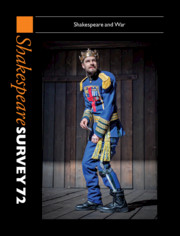Book contents
- Shakespeare Survey
- Shakespeare Survey
- Shakespeare Survey
- Copyright page
- Editor’s Note
- Contributors
- Contents
- Illustrations
- Henry V after the War on Terror
- Economies of Gunpowder and Ecologies of Peace: Accounting for Sustainability
- Shakespeare and Religious War: New Developments on the Italian Sources of Twelfth Night
- ‘Thou Laidst No Sieges to the Music-Room’: Anatomizing Wars, Staging Battles
- Shakespearian Narratives of War: Trauma, Repetition and Metaphor
- War Without Shakespeare: Reading Shakespearian Absence, 1642–1649
- Antic Dispositions: Shakespeare, War and Cabaret
- The Comedy of Hamlet in Nazi-Occupied Warsaw: An Exploration of Lubitsch’s To Be or Not to Be (1942)
- The Lion and the Lamb: Hamlet in London during World War II
- Dividing to Conquer or Joining the ReSisters: Shakespeare’s Lady Anne (and Woolf’s Three Guineas) in the Wake of #MeToo
- The Homeland of Coriolanus: War Homecomings between Shakespeare’s Stage and Current Complex TV
- Scholarly Method, Truth and Evidence in Shakespearian Textual Studies
- Beautiful Polecats: The Living and the Dead in Julius Caesar
- Ancient Aesthetics and Current Conflicts: Indian Rasa Theory and Vishal Bhardwaj’s Haider (2014)
- Failure to Thrive
- Tippett’s Tempest: Shakespeare in The Knot Garden
- Tautological Character: Troilus and Cressida and the Problems of Personation
- ‘Rude Wind’: King Lear – Canonicity versus Physicality
- Content but Also Unwell: Distributed Character and Language in The Merchant of Venice
- Autistic Culture, Shakespeare therapy and the Hunter Heartbeat Method
- The Senecan Tragedy of Feste in Twelfth Night
- Shakespeare Performances in England, 2018
- Professional Shakespeare Productions in the British Isles, January–December 2017
- The Year’s Contributions To Shakespeare Studies
- Abstracts of Articles in Shakespeare Survey 72
- Index
The Senecan Tragedy of Feste in Twelfth Night
Published online by Cambridge University Press: 18 September 2019
- Shakespeare Survey
- Shakespeare Survey
- Shakespeare Survey
- Copyright page
- Editor’s Note
- Contributors
- Contents
- Illustrations
- Henry V after the War on Terror
- Economies of Gunpowder and Ecologies of Peace: Accounting for Sustainability
- Shakespeare and Religious War: New Developments on the Italian Sources of Twelfth Night
- ‘Thou Laidst No Sieges to the Music-Room’: Anatomizing Wars, Staging Battles
- Shakespearian Narratives of War: Trauma, Repetition and Metaphor
- War Without Shakespeare: Reading Shakespearian Absence, 1642–1649
- Antic Dispositions: Shakespeare, War and Cabaret
- The Comedy of Hamlet in Nazi-Occupied Warsaw: An Exploration of Lubitsch’s To Be or Not to Be (1942)
- The Lion and the Lamb: Hamlet in London during World War II
- Dividing to Conquer or Joining the ReSisters: Shakespeare’s Lady Anne (and Woolf’s Three Guineas) in the Wake of #MeToo
- The Homeland of Coriolanus: War Homecomings between Shakespeare’s Stage and Current Complex TV
- Scholarly Method, Truth and Evidence in Shakespearian Textual Studies
- Beautiful Polecats: The Living and the Dead in Julius Caesar
- Ancient Aesthetics and Current Conflicts: Indian Rasa Theory and Vishal Bhardwaj’s Haider (2014)
- Failure to Thrive
- Tippett’s Tempest: Shakespeare in The Knot Garden
- Tautological Character: Troilus and Cressida and the Problems of Personation
- ‘Rude Wind’: King Lear – Canonicity versus Physicality
- Content but Also Unwell: Distributed Character and Language in The Merchant of Venice
- Autistic Culture, Shakespeare therapy and the Hunter Heartbeat Method
- The Senecan Tragedy of Feste in Twelfth Night
- Shakespeare Performances in England, 2018
- Professional Shakespeare Productions in the British Isles, January–December 2017
- The Year’s Contributions To Shakespeare Studies
- Abstracts of Articles in Shakespeare Survey 72
- Index
Summary
A. C. Bradley here invokes Epictetus as a Greek source of the classical Stoicism that was exerting an increasing influence on the intellectual life of Renaissance England. Fostered by James Sanford’s 1567 translation of Epictetus’ Enchiridion into English as The Manuell,2 this influence accommodates what Bradley’s association of Epictetus with Feste can be seen to suggest: which is that the character Shakespeare has created in Feste is, like Epictetus, a Stoic.
- Type
- Chapter
- Information
- Shakespeare Survey 72 , pp. 268 - 283Publisher: Cambridge University PressPrint publication year: 2019

